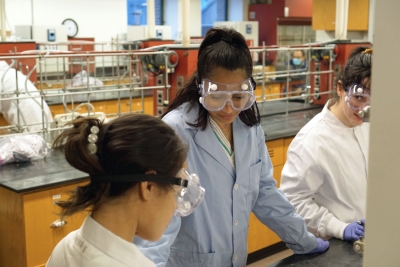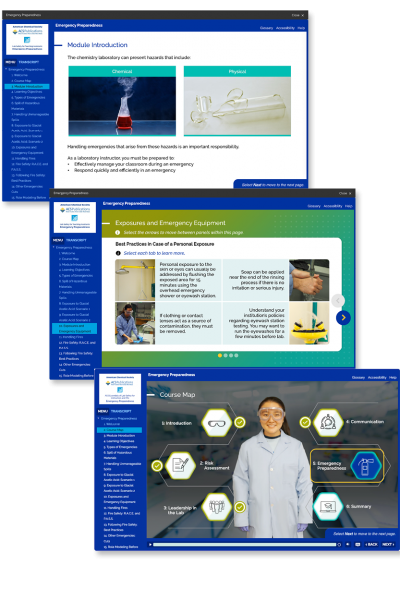ACS Essentials of Lab Safety for Instructors and TAs
Prepare instructors and TAs to become effective leaders in the lab
This course prepares TAs and new laboratory instructors to become effective leaders in lab safety by reviewing best practices, communication skills, and role modeling behaviors in the laboratory to support a safe learning environment.

Why ACS Essentials of Lab Safety for Instructors & TAs
ACS Essentials of Lab Safety for Instructors & TAs is a 90-minute online course that delivers essential, actionable, and sustainable safety training for new lab leaders. Developed by leading experts, the six interactive learning modules in ACS Essentials of Lab Safety for Instructors & TAs introduce the RAMP framework, a commonly used laboratory risk assessment method, and walk learners through the four principles of RAMP—Recognize hazards, Assess risks, Minimize risks, and Prepare for emergencies.
Critical safety and leadership instruction builds confidence in first-time lab leaders and is brought to life through narrated presentations using real-life photos, videos containing advice from real lab instructors and TAs, and printable resources for additional learning.

Learning Objectives
- Utilize the components of RAMP to ensure safe lab lessons
- Apply risk-based thinking, communication, and leadership skills
- Respond effectively to near misses, lab incidents, and emergencies

Course Highlights
Flexible: Course content is on demand, and you have flexibility in terms of how it’s integrated into your lab training offerings.
Relevant: As with all ACS courses, ACS Essentials of Lab Safety for Instructors & TAs is developed with academic and real-world relevance to ensure learners can apply what they learn with ease.
Engaging: Using real-life photos, knowledge checks and assessments, videos containing advice from real lab instructors and TAs, and printable resources, learners will be engaged from start to finish.
Authoritative: ACS Essentials of Lab Safety curriculum is developed by experts in the field of Lab Safety. Content has been developed to give weight to the seriousness of safety in the lab, without using scare tactics or focusing too heavily on extreme scenarios, all while encompassing the excitement of taking on a first-time leadership role.
Accessible: ACS is committed to ensuring that all our learning resources are accessible to all users and compatible with leading assistive technologies.
Customer Reviews
Trusted Subject Matter Experts
We have a team of experienced researchers and educators who are committed to delivering up-to-date, high-quality content. Each topic is carefully chosen to demonstrate the crucial safety concepts and skills that every safety leader needs.
EH&S Associate Manager, Columbia University in the City of New York
Sandra Keyser is an Associate Manager for EH&S Research Safety at Columbia University after having taught undergraduate chemistry lab courses at several institutions for more than a decade. She is a member of the Division of Chemical Health and Safety and an associate member of Committee on Chemical Safety.
Teaching Professor, Xavier University
Kendra Leahy Denlinger has worked as a Teaching Professor in the Chemistry Department at Xavier University in Cincinnati, Ohio since the fall of 2019. Her graduate research was in the area of green chemistry, specifically mechanochemical organic transformations using polymer-bound reagents and catalysts. She has served several years as an associate member of the Committee on Chemical Safety as well as a member of the Division of Chemical Health and Safety.
Associate Professor of Chemistry, Wagner College
Racquel DeCicco is an Associate Professor of Chemistry at Wagner College in Staten Island, NY. She has taught general and organic chemistry laboratory courses at several institutions, and has facilitated safety training for new faculty, students, and members of her research lab.
Senior Lecturer in Chemistry, Columbia University in the City of New York
Joseph C. Ulichny received his M.A. in Chemistry from Columbia University, working under the direction of Professor Gerard Parkin. He earned the Excellence in Chemistry Award from the University of Scranton (2006), as well as the Jack Miller Teaching Award from Columbia University (2008). While in graduate school, he worked on synthetic and structural inorganic projects in the Parkin Lab. Joseph became the General Chemistry Course Coordinator in 2010. He was promoted to Senior Lecturer in Chemistry in 2022.
Course Outline
This module provides valuable tips on how to guide laboratory students to work safely.
By the end of this module, learners will be able to:
- Explain safety culture and roles and responsibilities.
- Encourage safe behaviors and attitudes.
This module introduces the RAMP framework that is used to outline the steps of risk assessment.
By the end of this module, learners will be able to:
- Explain the components of RAMP.
- Apply the components of RAMP.
This module helps instructors and TAs become effective role models and leaders while running the lab.
By the end of this module, learners will be able to:
- Recognize the role of a laboratory instructor in ensuring lab safety.
- Provide safety tips for students.
- Identify best practices to conduct yourself as a leader and role model.
This module focuses on scientific communication between lab leaders and their students, as well as their colleagues, to help establish a strong safety culture in the laboratory.
By the end of this module, learners will be able to:
- Identify ways to communicate effectively with students and peers about safety.
- Recognize the best practices to create a culture of open communication and facilitate a positive safety culture in the lab.
This module provides instructors and TAs with the skills necessary to respond quickly, confidently, and effectively in case of an emergency in your laboratory.
By the end of this module, learners will be able to:
- Identify types of emergencies so that you can act on them and ensure your and your students’ safety.
- Behave appropriately before, during, and after an emergency.
- Train the students to behave appropriately during emergencies.
- Identify the steps needed to respond during an emergency.
This final module reviews what the student learned about risk assessment, leadership, communication in the lab, and emergency preparedness. These skills you have developed will set you up for success in the teaching laboratory and beyond.
Get access
ACS Essentials of Lab Safety for Instructors and TAs is available to academic, corporate, and government institutions. This course can be easily integrated into your existing learning management system (LMS). Request your free 30-day access to evaluate the course.
Get Access





